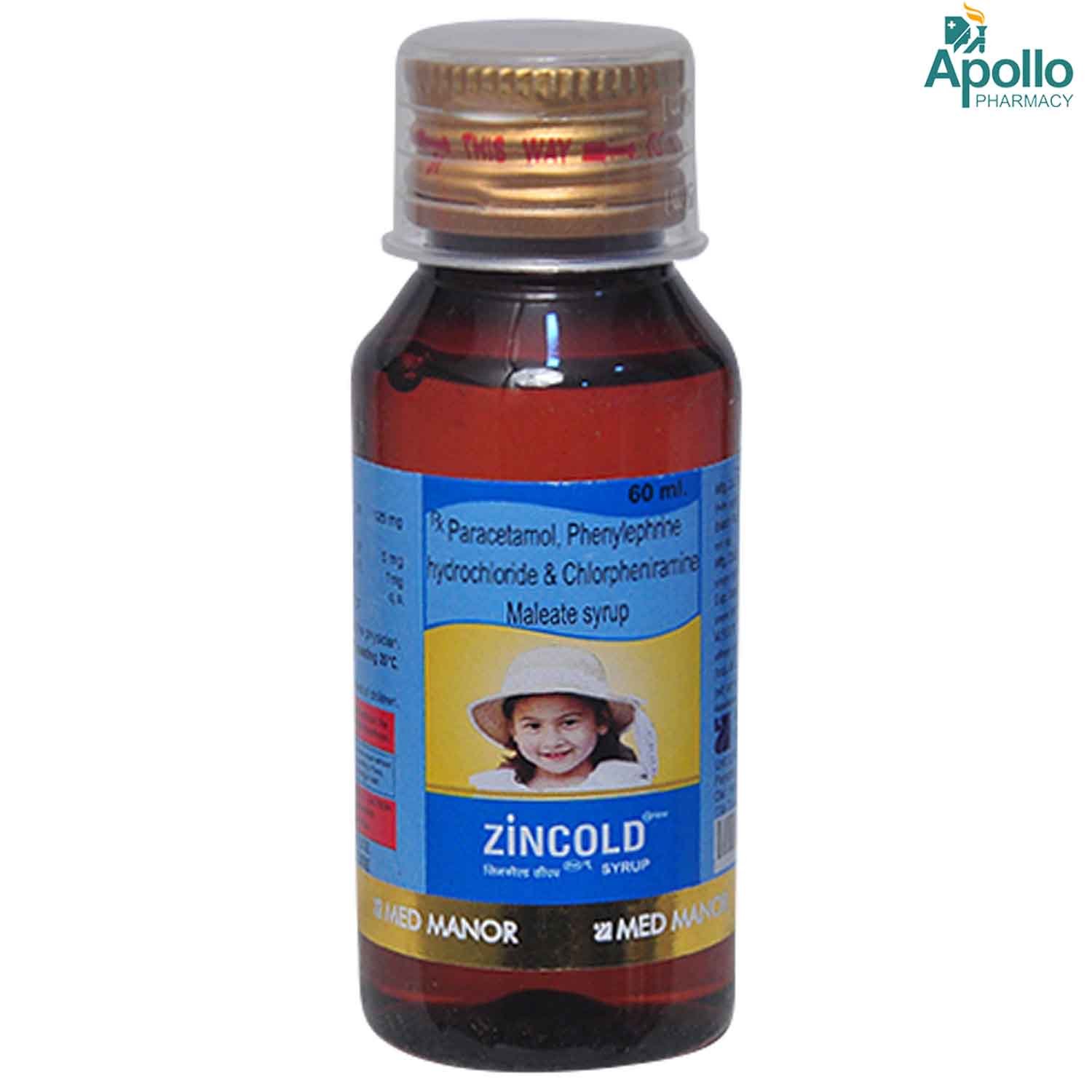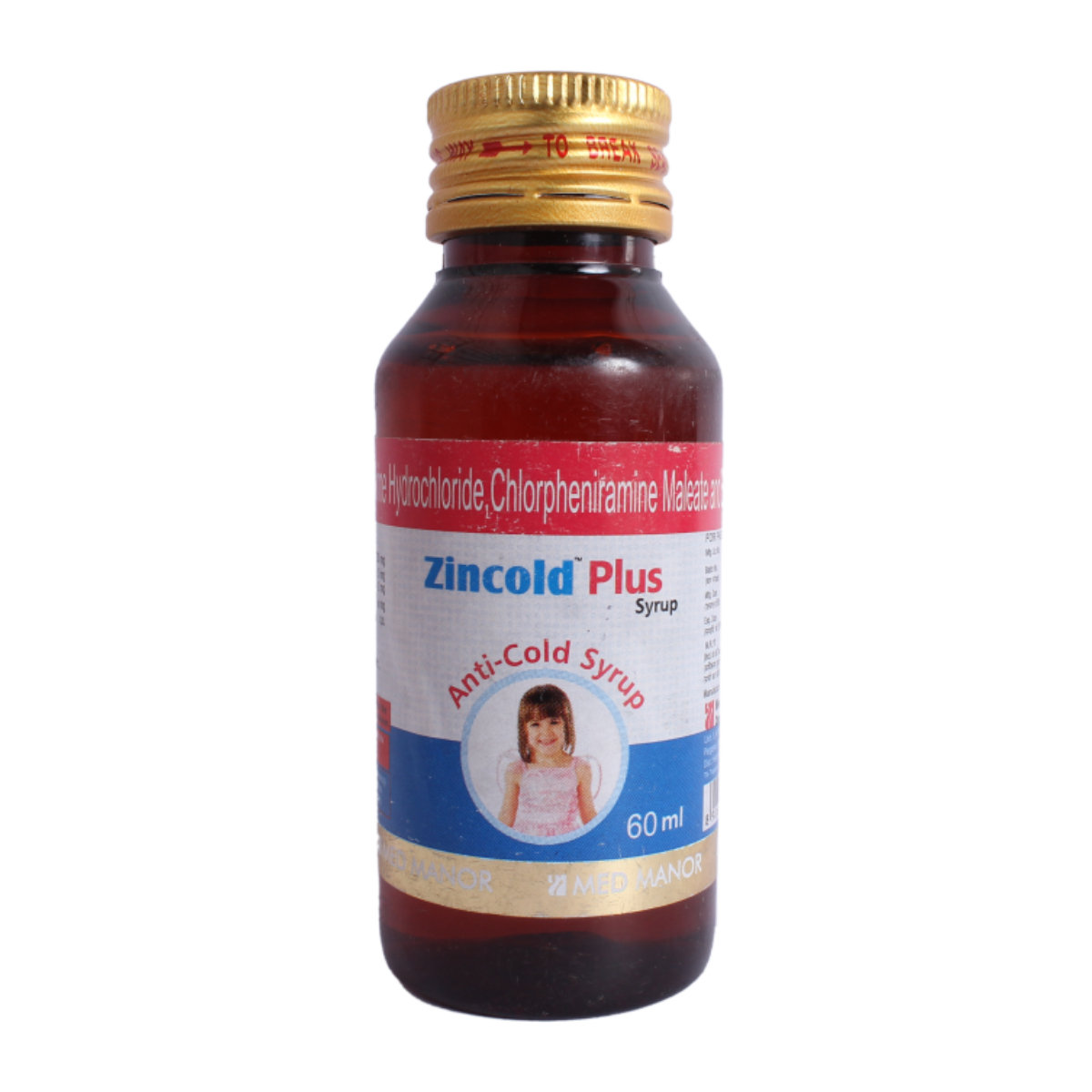Cetirizine+paracetamol+phenylephrine+zinc
About Cetirizine+paracetamol+phenylephrine+zinc
Cetirizine+paracetamol+phenylephrine+zinc belongs to a class of medications called ‘Cough, and cold preparations’ used to treat the common cold and allergic symptoms such as a runny nose, sneezing, itchy or watery eyes and blocked nose. The common cold is a nose and throat respiratory illness caused by ‘rhinoviruses’. Allergies are immune system reactions to foreign bodies or allergens such as certain foods, chemicals, pet dander or pollen.
Cetirizine+paracetamol+phenylephrine+zinc contains Cetirizine, Paracetamol, Phenylephrine, and Zinc. Cetirizine is an antihistamine (anti-allergic drug) that works by blocking the action of histamine, a substance responsible for causing allergy symptoms such as sneezing, running nose, watery eyes, itching, swelling or congestion. Paracetamol is an analgesic (relieves pain) and antipyretic (reduces fever). It works by inhibiting prostaglandin's production (chemical messengers) that are responsible for pain and fever. Phenylephrine is a decongestant that contracts and narrows the blood vessels of nasal passages and airways, reducing swelling and stuffy nose. Zinc is a nutritional supplement that helps to fight infection and provides quick relief from the symptoms.
Cetirizine+paracetamol+phenylephrine+zinc is available in the form of tablets and syrup. You should take this medicine as prescribed by your doctor. The common side-effects of Cetirizine+paracetamol+phenylephrine+zinc are nausea (feeling sick), vomiting (being sick), drowsiness, headache, tiredness, stomach upset, restlessness, dry mouth, flushing (reddening of the skin) and anorexia (loss of appetite). These side effects are usually mild and temporary. However, consult your doctor immediately if these side effects persist or worsen.
Do not take Cetirizine+paracetamol+phenylephrine+zinc if you are allergic to any contents of it. Before taking Cetirizine+paracetamol+phenylephrine+zinc, inform your doctor if you have hypertension (high blood pressure), heart diseases, urination problems, epilepsy (fits), thyroid disorders, kidney diseases and liver failure. Do not take Cetirizine+paracetamol+phenylephrine+zinc if you use sleeping pills or medicines to treat depression. Inform your doctor if you are pregnant or breastfeeding. Cetirizine+paracetamol+phenylephrine+zinc may cause drowsiness, so do not take alcohol as it causes excessive drowsiness. Also, do not drive or operate heavy machinery if you are drowsy. Cetirizine+paracetamol+phenylephrine+zinc should be used with caution in children and elderly people as they may require dose adjustments.
Uses of Cetirizine+paracetamol+phenylephrine+zinc
Medicinal Benefits
Cetirizine+paracetamol+phenylephrine+zinc contains Cetirizine, Paracetamol, Phenylephrine, and Zinc. Cetirizine belongs to the class of antihistamines (anti-allergic drugs) that works by blocking the action of histamine, a substance responsible for causing allergic reactions. It helps relieve allergy symptoms such as sneezing, running nose, watery eyes, itching, swelling, congestion or stiffness. Paracetamol is an analgesic (relieves pain) and antipyretic (reduces fever) that works by inhibiting the production of certain chemical messengers in the brain known as 'prostaglandins responsible for pain and fever. Phenylephrine helps in shrinking the blood vessels in the nostrils and the nasal passage and reducing stuffy nose. Zinc is a nutritional supplement that helps to fight infection and provides quick relief from the symptoms. Together, Cetirizine+paracetamol+phenylephrine+zinc can effectively treat common cold and allergy symptoms.
Directions for Use
Storage
Side Effects of Cetirizine+paracetamol+phenylephrine+zinc
- Nausea (feeling sick)
- Vomiting (being sick)
- Drowsiness
- Headache
- Tiredness
- Stomach upset
- Restlessness
- Dry mouth
- Flushing (skin reddening)
- Anorexia (loss of appetite)
Drug Warnings
Do not take Cetirizine+paracetamol+phenylephrine+zinc if you have taken medicines to treat depression in the past 14 days. Before taking Cetirizine+paracetamol+phenylephrine+zinc, inform your doctor if you are taking sleeping pills. Cetirizine+paracetamol+phenylephrine+zinc syrup contains sucrose, so use this medicine with caution in patients with intolerance to sugars. Inform your doctor immediately if you notice any difficulty urinating as Cetirizine+paracetamol+phenylephrine+zinc may cause urination problems. If you are pregnant or a breastfeeding mother, it is advised to consult a doctor before using Cetirizine+paracetamol+phenylephrine+zinc. Cetirizine+paracetamol+phenylephrine+zinc is given to pregnant women after a risk/benefit assessment. Cetirizine+paracetamol+phenylephrine+zinc may decrease breast milk production, and it should be used with caution in breastfeeding mothers.
Drug Interactions
Drug-Drug Interactions: Cetirizine+paracetamol+phenylephrine+zinc may interact with medicines used to treat nausea and vomiting (domperidone and metoclopramide), antidepressants or monoamine oxidase (MAO) inhibitors (isocarboxazid. linezolid, methylene blue, moclobemide, phenelzine, procarbazine, rasagiline, safinamide, selegiline, and tranylcypromine), anticoagulant (warfarin), a medicine used to treat high cholesterol (cholestyramine), and sedatives (alprazolam, lorazepam, and zolpidem).
Drug-Food Interactions: Avoid taking this medication with foods high in calcium or phosphorus, such as milk, cheese, yoghurt, nuts, lentils, beer, peanut butter and soft drinks.
Drug-Disease Interactions: Cetirizine+paracetamol+phenylephrine+zinc should be used with caution in patients with hypertension (high blood pressure), heart diseases, urination problems, epilepsy (fits), thyroid disorders, kidney diseases and liver failure.
Drug-Drug Interactions Checker List:
Safety Advice

Alcohol
cautionAlcohol consumption may cause excessive drowsiness and increase the risk of other side effects.

Pregnancy
cautionCetirizine+paracetamol+phenylephrine+zinc is not recommended for use in pregnancy. If you are pregnant, consult your doctor before taking this medicine. Your doctor may prescribe this medicine if the benefits outweigh the risks.

Breast Feeding
cautionCetirizine+paracetamol+phenylephrine+zinc may decrease breast milk production and should be used with caution in breastfeeding mothers.

Driving
cautionCetirizine+paracetamol+phenylephrine+zinc may cause drowsiness. So, avoid driving or operating heavy machinery while using this medicine if you are drowsy.

Liver
cautionCetirizine+paracetamol+phenylephrine+zinc should be used with caution in patients with liver diseases. If you have liver problems, inform your doctor before taking this medicine. Your doctor may adjust the dose if required based on your condition.

Kidney
cautionCetirizine+paracetamol+phenylephrine+zinc should be used with caution in patients with kidney diseases. If you have kidney problems, inform your doctor before taking this medicine. Your doctor may adjust the dose if required based on your condition.

Children
cautionCetirizine+paracetamol+phenylephrine+zinc should be used with caution in children. Your doctor will decide the dose based on your child's age, bodyweight and condition.
Habit Forming
Diet & Lifestyle Advise
- Staying hydrated is vital for those with a cough or cold. Drinking liquids at room temperature can alleviate cough, runny nose, and sneezing.
- The immune system is affected by stress and raises the risk of being sick. An individual can exercise regularly, meditate, do deep breathing, and try progressive muscle relaxation techniques to relieve stress.
- Try to sleep at least 8 hours a day.
- It is advised to avoid contact with known allergens (allergy-causing agents) such as pollen, dust, etc. Certain food items are known to cause allergies to you.
- Maintain personal hygiene and keep your surroundings clean.
Special Advise
If you are undergoing an allergy test, the doctor might advise you to stop Cetirizine+paracetamol+phenylephrine+zinc 3 days before the test as this medicine may interfere with the test results.
Patients Concern
Disease/Condition Glossary
Common cold: The common cold is an infection caused by a virus, primarily rhinoviruses, which affects the nose and throat (upper respiratory tract). Children under six are at the greatest risk of catching a cold, but healthy adults can also catch 2-3 colds yearly. Most people recover from cold symptoms within a week or ten days. Symptoms may last longer in people who smoke or are exposed to allergens such as pollutants, dust, etc. Common cold symptoms include sneezing, sore throat, cough, congestion, mild body pains, low fever, mild headache, feeling unwell, and a stuffy or runny nose. In some cases, nasal discharge may thicken and turn yellow or green, but this does not indicate bacterial infection.
Allergies: These occur when foreign elements that cause allergies (allergens) attack and invade our bodies, causing histamines to be released. Swelling, inflammation, redness, itchiness, itchy/watery nose, throat, and eyes are caused by the chemical messenger 'histamines.' Allergies are commonly caused by chemicals, air pollution, pet danders, dust, pollen hairs, seasonal allergies such as hay fever, and other factors.
FAQs
Cetirizine+paracetamol+phenylephrine+zinc is composed of four medicines, namely Cetirizine, Paracetamol, Phenylephrine, and Zinc. Cetirizine is an anti-allergic drug that works by blocking the action of histamine, a substance responsible for causing allergic symptoms such as sneezing, running nose, watery eyes, itching, swelling, and congestion. Paracetamol is an analgesic (relieves pain) and antipyretic (reduces fever) that works by inhibiting the production of certain chemical messengers (prostaglandins) in the brain responsible for pain and fever. Phenylephrine narrows the blood vessels in the nostrils and the nasal passage and reduces stuffy nose. Zinc is a nutritional supplement that helps fight infection and provides quick relief from the symptoms. Together, Cetirizine+paracetamol+phenylephrine+zinc can effectively treat common cold and allergy symptoms.
Cetirizine+paracetamol+phenylephrine+zinc should not be used if you have taken antidepressants in the last 14 days. So, it is always advised to inform your doctor about all the prescription, non-prescription and dietary supplements you are taking to identify any interactions with the Cetirizine+paracetamol+phenylephrine+zinc.
Cetirizine+paracetamol+phenylephrine+zinc should be used with caution in patients with hypertension (high blood pressure), heart diseases, urination problems, epilepsy (fits), thyroid disorders, kidney diseases and liver failure.
The common side-effects of Cetirizine+paracetamol+phenylephrine+zinc are nausea (feeling sick), vomiting (being sick), drowsiness, headache, tiredness, stomach upset, restlessness and dry mouth. These side effects are usually mild and temporary. However, consult your doctor immediately if these side effects persist or worsen.
Cetirizine+paracetamol+phenylephrine+zinc may not interact with antibiotics. It is probably safe when Cetirizine+paracetamol+phenylephrine+zinc is used and antibiotics when prescribed by your doctor.
No, there is no evidence that Cetirizine+paracetamol+phenylephrine+zinc is habit-forming or addictive.





